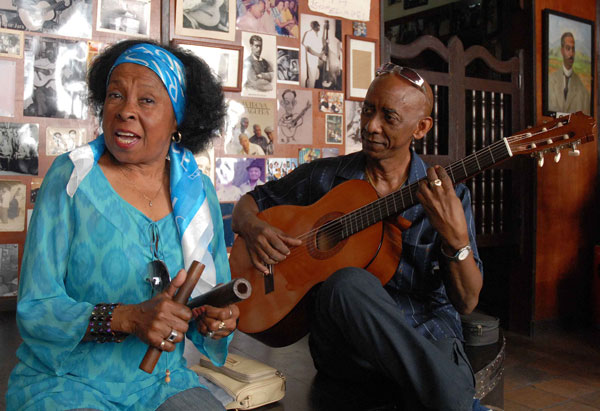Eva Griñan is considered by many a true "Diva of trova", at least in her native Santiago de Cuba. Listening to her singing is a real privilege, even at 60, her voice retains the gift of charming when she sings anthological themes like La rosa oriental, Pensamiento or Lágrimas negras.
Eva owns a vast repertoire; in more than four decades dedicated to music she has tackled almost all popular genres due to her immense interpretative conditions.
Eva´s father, late troubadour and composer Jose Griñan, is one of her highest inspirations, so much so that her only album was titled as one of his songs, Pensando en ti.
What is the formation of Eva Griñan?
I come from a family of musicians, so I began singing when I was a child and I often used to recite at my father’s work.
I am the youngest of three children, but the only one who inherited the musical qualities of my father, the atmosphere at home led me to choose singing as a profession.
After participating in the Literacy Campaign, I studied at the National School of Art with Romanian Professor Ana Talmaciano (former singer of the Bucharest Opera), and completed my academic stage at the Higher Center for Art and Culture of Santiago de Cuba.
In 1967 I joined the chorus Orfeón Santiago, founded by Master Electo Silva, which is a real source of singers and provides one of the world’s major vocal training.
It was a great chance to work on that chorus; I learned a lot and was a great school for me. Much of what is today Eva Griñán owes it to Orfeón Santiago and to Electo Silva.
How do you get to Proposición 4?
In 1983 I decided to leave the Orfeón because I wanted do other kind of work, the following year I became part of a quartet called Proposicion 4, in which I did wonderful things.
During the period I was in that group, until 1999, some of our hits were included in two albums produced by the Siboney Studios belonging to the Music Editions and Recordings Enterprise (EGREM), but we never reached the recognition of similar formations as Los del Rey, Los Meme, and others, but we made a very interesting vocal work for several years here in Santiago de Cuba.
I remained with them until I started my solo career, mainly singing in cabarets, night clubs and shows, including Tropicana Santiago, of which I am founder.
Eva and the trova …
Then it came a time when so much work got me exhausted, and thus taking into account the breadth of my repertoire and my desire to sing other types of songs, let us say a little more intimate, I decided to go to the Casa de la Trova, where I began to work on my father´s compositions.
Someone warned me about the need to find a guitarist to accompany me; a good interpreter of that instrument would highlight my work and would give the final trova ambience I wanted to achieve. That was how I convinced master Gabino Jardines, who hadn´t played the guitar for two decades, and we have worked together for almost 15 years.
I’m in the trova because I feel that is the genre that suits my voice; I have it inside, it´s part of me. I also want to publicize the work of my father, though I can take any genre.
I have a very vast repertoire; I can sing either something from Venezuela, Paraguay, or a bolero from the 50s of last century.
I´m arriving at 45 years of my artistic career and I have recorded a single album as a soloist. It was with EGREM in 2006 and is called Pensando en ti (Thinking of you).
Who are your favorite composers?
My favorite composers, the ones I love and admire the most are Miguel Matamoros, who did so much for Santiago de Cuba and the national culture, Alberto Villalon, Sindo Garay, Manuel Corona, but I also enjoy singing works Isolina Carrillo.
Among contemporary authors I prefer Pablo Milanes and Silvio Rodriguez.
When I sing I give love and also convey strength, singing gives me energy and is my reason to exist, so I won´t stop doing it, only when death comes.
What do Cuba and Santiago represent for Eva Griñan?
Cuba has a special meaning for me, if I wouldn´t be Cuban I wouldn´t sing as I do. I sang out of my country for the first time in 2002, in Barranquilla, Colombia, but also in Spain, France and other European countries, and what distinguishes me from other singers has been singing just as Cuban, although paradoxically I´m not very popular in my country.
Santiago de Cuba is like the air I breathe, here are my people, my music; this city is like a serum for me, so I think I’ll last long.
Even at this age I have high aspirations as a singer and I still hope pleasant surprises from music. I´d like to be as Compay Segundo, who kept singing until a venerable age, I´d like people to admire and respect me as he was throughout Cuba.










